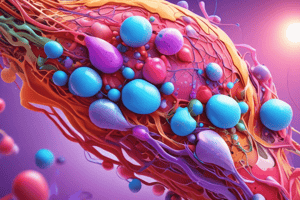Podcast
Questions and Answers
What is the rapid-acting insulin that can be inhaled?
What is the rapid-acting insulin that can be inhaled?
- Inhaled human insulin (afrezza) (correct)
- Insulin Lispro (Humalog)
- Insulin Glulisine (Apidra)
- Insulin Aspart (Novolog)
Which drug is a GLP-1 receptor agonist?
Which drug is a GLP-1 receptor agonist?
- Exenatide (correct)
- Empagliflozin
- Lantus
- Dapagliflozin
What type of insulin is Regular insulin U-100?
What type of insulin is Regular insulin U-100?
- Intermediate-acting insulin
- Rapid-acting insulin
- Long-acting insulin
- Short-acting insulin (correct)
Which drug is a Dipeptidyl Peptidase-4 (DPP-4) inhibitor?
Which drug is a Dipeptidyl Peptidase-4 (DPP-4) inhibitor?
Which medication is a Sulfonylurea?
Which medication is a Sulfonylurea?
Which class of drugs help in inhibiting the Sodium-Glucose Linked Transporter-2 (SGLT-2)?
Which class of drugs help in inhibiting the Sodium-Glucose Linked Transporter-2 (SGLT-2)?
Which medication is used as an Intermediate-acting insulin?
Which medication is used as an Intermediate-acting insulin?
'Starlix' is associated with which class of medications?
'Starlix' is associated with which class of medications?
'Tresiba' falls under which category of insulins?
'Tresiba' falls under which category of insulins?
'Lixisenatide' is classified as which type of medication?
'Lixisenatide' is classified as which type of medication?
Flashcards are hidden until you start studying
Study Notes
Endocrine System
- The endocrine system is a hormone system that consists of glands that secrete hormones into the blood.
- Hormones are secretions of endocrine glands that affect other organs and tissues.
- Target cells, tissues, or organs are affected by hormones.
- The feedback mechanism allows the endocrine system to secrete hormones constantly.
Types of Feedback
- Negative feedback moves below a certain range, resulting in hypothyroidism (producing too little).
- Positive feedback promotes more of a hormone until an input stops it, resulting in hyperthyroidism (producing too much).
Pituitary Gland
- The pituitary gland plays a leading role in the endocrine system.
- It produces hormones such as triiodothyronine (T3) and thyroxine (T4), which stimulate body tissue and increase their metabolic rate.
- The feedback mechanism involves thyroid-stimulating hormone (TSH) produced by the pituitary gland.
Adrenal Glands
- The adrenal medulla (inner) secretes epinephrine (adrenaline) and norepinephrine.
- The adrenal cortex (outer portion) secretes corticosteroids, including glucocorticoids (fat, protein, and metabolism) and mineralocorticoids (electrolyte and cortisol).
Diabetes
- Type 1 diabetes: born with it, not making any insulin at all.
- Type 2 diabetes: developed, making some insulin but not enough, reversible.
- Functions of insulin: helps burn glucose for energy, binds with cell membrane receptors to allow glucose uptake, enhances amino acid transport, increases ion transport, and maintains blood glucose levels.
Thyroid Disorders and Drug Treatment
- Hypothyroidism: lower levels, increases appetite, treated with thyroid replacement agents (levothyroxine, liothyroxine).
- Hyperthyroidism: higher levels, decrease in appetite, causes include Graves' disease, tumors, and thyroid nodules, symptoms include weight loss and exophthalmos, treated with methimazole and propylthiouracil (PTU).
Adrenal Glands and Drug Treatment
- Cushing's syndrome: an excess of cortisol production.
- Addison's disease: life-threatening deficiency of glucocorticoids and mineralocorticoids.
- Corticosteroid therapy: betamethasone, budesonide, cortisone, dexamethasone, hydrocortisone, methylprednisolone, prednisolone, prednisone.
Diabetes and Drug Treatment
- Diabetes: characterized by elevated blood glucose due to insufficient insulin levels, blood glucose levels above 140 mg/dL = long-term effects.
- Symptoms: frequent infections, glycosuria, hunger, and thirst, polyuria, nocturia, numbness, and tingling, slow wound healing, blurry vision, nausea, weight loss, ketoacidosis.
- Complications of diabetes: retinopathy, neuropathy, vascular problems, dermatologic problems, nephropathy.
Types of Diabetes
- Type 1: children and young adults.
- Type 2: patients over 40.
- Gestational diabetes: occurs in the second and third trimesters of pregnancy.
- Second diabetes: due to the use of drugs.
Insulin Treatment
- Goal: to revert to non-diabetic physiology.
- Treatment: healthy eating, exercise, blood glucose monitoring, insulin therapy.
- Blood glucose goal: 80 to 130 mg/dL.
- Insulin products: rapid-acting insulin (inhaled human insulin, insulin aspart, insulin glulisine, insulin lispro), intermediate-acting insulin (neutral protamine Hagedorn insulin), short-acting insulin (regular insulin), long-acting insulin (insulin degludec, insulin detemir, insulin glargine).
Other Medications
- Glucagon-like peptide 1 (GLP-1) receptor agonists: albiglutide, dulaglutide, exenatide, exenatide ER, liraglutide, lixisenatide, semaglutide.
- Dipeptidyl peptidase-4 (DPP-4) inhibitors: alogliptin, linagliptin, saxagliptin, sitagliptin.
- Metformin (biguanide): metformin, metformin sodium-glucose linked transporter-2 (SGLT-2) inhibitors.
- Insulin secretagogues: sulfonylureas (glimepiride, glipizide, glyburide), meglitinide (nateglinide), thiazolidinediones (pioglitazone, rosiglitazone).
- Complementary: chromium, cinnamon.
Studying That Suits You
Use AI to generate personalized quizzes and flashcards to suit your learning preferences.




